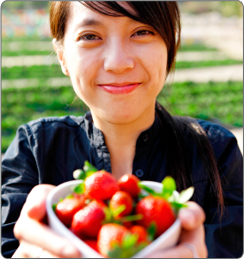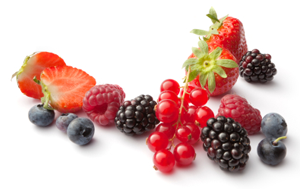Why an Antioxidant-Rich Diet is Important for Good Health
What are Antioxidants?
Antioxidants are compounds that protect our body’s cells from free radical damage. Free radicals are highly unstable molecules that are produced during natural body processes such as digestion and after exposure to environmental contaminants, radiation, cigarette smoke and some chemicals.
Scientists believe that the damage caused by free radicals may play a role in the development of many diseases including heart disease, Alzheimer’s disease, cancer, eye diseases such as macular degeneration, Parkinson’s disease and rheumatoid arthritis. And, studies suggest that diets rich in fruits and vegetables, foods that are loaded in antioxidants, are associated with a lower risk of many chronic diseases, which lends more support to the theory between free radical damage and chronic disease.

If you want to boost the antioxidants in your diet, you have plenty of choices. Antioxidants are found in a wide variety of foods including fruits, vegetables, nut, seeds, wine, tea, soy foods, legumes and grain cereals. Some examples of antioxidants that you’ve probably heard of include vitamins C, A and E, beta-carotene, coenzyme Q10, flavonoids and lycopene. In addition, our body can produce antioxidants.
Because there are so many antioxidants, how do you decide which ones are best for you?
Unfortunately, there is no clear-cut answer. Though some foods, beverages and dietary supplements claim they contain a large quantity of antioxidants or tout a high ORAC score (a measure of antioxidant capacity), these claims mean nothing for consumers. The tests that estimate the total antioxidant capacity of a food, beverage or supplement do not provide a complete picture of antioxidant capacity or take into account how well the antioxidants are absorbed and used by the body.
Antioxidant Absorption
And, there are many different factors that influence the absorption and use of antioxidants including the form of the food (liquid or solid), the amount consumed, other foods consumed at the same time, the mix of bacteria in our gut, genetics, our health status and age. And, though scientists have identified many antioxidants and functions attributable to these antioxidants, there is much we still do not know about antioxidants and how they work. In addition, there are likely thousands of antioxidants found in nature and many of these haven’t been identified yet.
Antioxidant Supplements
Though antioxidant supplements sound appealing, and they may be helpful in some instances, popping antioxidants like candy won’t ensure better health and disease prevention. Though some studies show a benefit from taking specific antioxidant supplements and reducing one’s risk of certain diseases such as age-related macular degeneration, other studies examining specific antioxidants and disease haven’t shown equally promising results.

Because we don’t know which antioxidants may be most important for specific health issues (with the exception of specific antioxidants and certain eye diseases) or what the optimal intakes are for promoting good health and preventing disease, consumers should consume a wide variety of antioxidant-rich foods with every meal and chew all food well since chewing food can help improve the absorption of antioxidants and other nutrients.
1 Antioxidant Supplements for Health: an Introduction. National Center for Complementary and Alternative Medicine, NIH. NCCAM Publication No. D450. May 2010. http://nccam.nih.gov/health/antioxidants/introduction.htm Accessed February 15, 2011.
2 A Daily Dose of Antioxidants? USDA Agricultural Research Magazine (2008). http://www.ars.usda.gov/is/AR/archive/mar08/fruit0308.htm Accessed February 15, 2011.
3 Prior, R.L., Gu, L., Wu, X., Jacob, R.A., Sotoudeh, G., Kader, A.A., Cook, R.A. (2007). Plasma Antioxidant Capacity Changes Following a Meal as a Measure of the Ability of a Food to Alter In Vivo Antioxidant Status. Journal of the American College of Nutrition, 26, 170-181.
4 Papas, A.M. (1999). Diet and Antioxidant Status. In: Papas, A.M. (Eds.), Antioxidant Status, Diet, Nutrition and Health (pp. 96-99). Boca Raton, FL: CRC Press.

